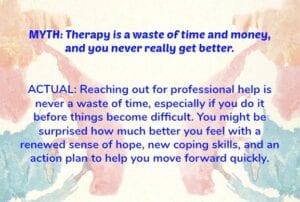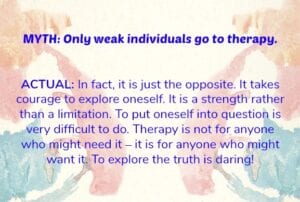
If you have never been to see a therapist before, you may have certain preconceived notions, which can stifle the therapeutic progress. You may believe myths about what therapy entails. However, therapy is so much more than lying on a couch for an hour. Below, are some common therapy myths debunked.
Myth 1: Therapy is a waste of time and money, and you never really get better.
Actual: Reaching out for professional help is never a waste of time, especially if you do it before things become difficult. The longer you wait, the bigger the issue may become. You might be surprised how much better you feel with a renewed sense of hope, new coping skills, and an action plan to help you move forward quickly.
Myth 2: You lie on the couch, and you do all the talking.
Actual: Therapeutic treatment can look many different ways, and may include office sessions, phone sessions, or home visits. Also, therapists offer feedback, resources, and encourage a collaborative process. Again, this is about finding the right therapist and the right treatment approach for you. Therapy will look different for every person.
Myth 3: There must be something really wrong with me if I need therapy.
Actual: Mental health still has quite a stigma attached to it. But if you were to have physical symptoms, you would see a doctor. Though in therapy your symptoms may not be as apparent, clients can get help from a variety of issues such as parenting, divorce, relationship issues, grief, or life transitions. Therapy emphasizes mental health and well-being and considers some difficulties and challenges a normal part of life.
Myth 4: Medication will quickly fix my problem.
Actual: Obviously, medication should be used in certain circumstances. However, therapy may help you get to the root of the problem, while medication may help you manage the problem. To use an analogy, you may have a beautiful garden overcome with weeds. You can mow down the weeds, but they will keep growing back until you pull them out by their roots.
Myth 5: All therapists are the same.
Actual: Actually, most mental health professionals have different licensure for different training. This can be confusing. Three important credentials to understand are: Psychologist, Psychiatrist, and the various Master’s level mental health professionals. Also, some therapists have extra training in a specialty such as marriage and family or trauma. Plus, different therapists use different approaches to therapy that best fits your needs.
- Psychologist: A psychologist will have a “PhD” or “PsyD” after their name. Psychologists have the highest level of training in psychology and providing therapy.
- Psychiatrist: A psychiatrist will have an “MD” after their name. Psychiatrists are medical doctors that complete their general medical training, and then go on to specialize in psychiatry. Most psychiatrists focus on prescribing and managing medications uses to treat mental health issues. They often work in collaboration with a therapist.
- Licensed Mental Health Practitioner (LMHP or LIMHP): Licensed Professional Counselors are required to complete a master’s degree in counseling or clinical psychology, two years of supervised post-degree experience, and to pass a written professional counselor’s examination to be licensed.
- Licensed Clinical Social Worker (LCSW): Licensed Clinical Social Workers must complete a master’s degree in social work, two years of supervised post-degree experience, and pass a written social work examination to be licensed.
- Provisional Licensed Mental Health Practitioner (PLMHP): Licensed provisional therapists complete a master’s degree with approximately two years of supervised post-degree experience.
It’s also important to understand that the titles “Therapist”, “Psychotherapist”, and “Counselor” are not legally regulated. This means that anyone can legally market themselves under those titles, and they may not have any related credentials or experience. Be very wary of anyone using any one of these titles only. Be sure to clarify his or her credentials, and only go to someone that has a verified licensed to practice.
Myth 6: The therapist has all the answers.
Actual: Every person is different and every presenting issue is different. After a full assessment, you and your therapist will sit down and make a treatment plan that fits your needs. Then, do the homework your therapist assigns to assist with finding solutions. Most of the work in therapy happens outside of the office. Therapy takes motivation, effort, and willfulness.
Myth 7: Only weak individuals go to therapy.
Actual: Actually, it is just the opposite. It takes courage to explore oneself. It is a strength rather than a limitation. To put oneself into question is very difficult to do. Therapy is not for anyone who might need it – it is for anyone who might want it. To explore the truth is daring!
Myth 8: Clients that come in have a major mental illness.
Actual: Among our clients, the major factor that brings people into therapy is trauma they have experienced. Mental and emotional injury, not major mental illnesses, are what we see affecting people. Injuries can be healed, while illnesses can only be managed. It is like the difference between a broken arm and diabetes. As a result of this injury perspective, we see most of our clients as no different as other people on the street, and do not have an “Us and them” division toward our clients.


